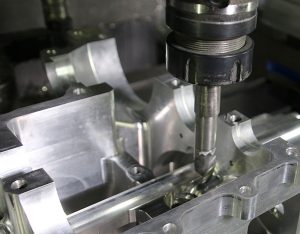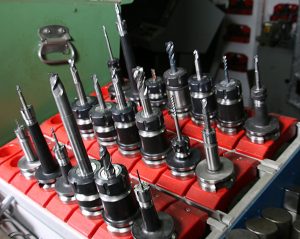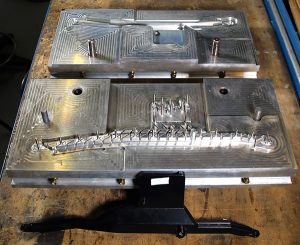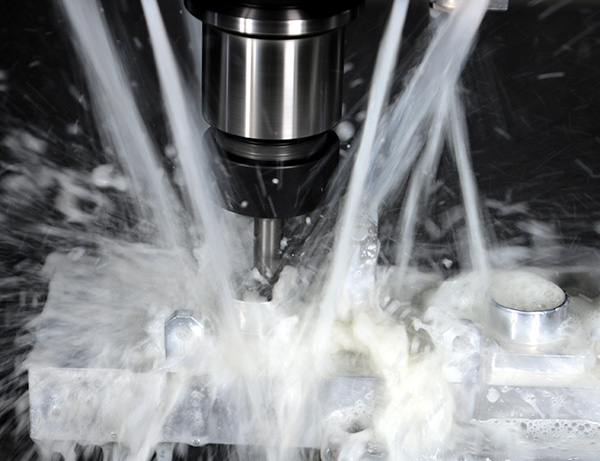Vetech Product Design & Development Ltd is a subcontract manufacturer that was conceived by engineers with an expertise in the garden equipment sector. When the Buxton-based company opened its doors for business in 1994, the founders applied their industry knowledge to win business from the globally recognised Bosch brand. Since its inception, the company has always invested in the latest technology to drive its business forward, and central to this strategy is support from its cutting tool partner Industrial Tooling Corporation (ITC).

More than just another subcontract manufacturer, Vetech offers design and consultancy services to a customer base that now incorporates high-profile names in the military, electronic sensor, motorsport and plastic moulding sectors, as well as the ever-expanding network of garden equipment manufacturers. Upwards of 60% of business at Vetech is aluminium mould tools for the garden and leisure industry; and it is here that cutting tool specialist ITC has made all the difference.
Over 10 years ago, Vetech realised that its CNC machine tools could not achieve the high spindle speeds required for machining mould tool ribs with small diameter cutting tools. Vetech visited the TCT trade show and found the solution on the ITC stand in the guise of high-speed spindles. Delivering immediate success, Vetech then approached ITC regarding its line of standard and special cutting tools.
Commenting upon the founding of the relationship that spans over a decade, Vetech senior design engineer Andy Smith says: “We found a solution for running our tools at high speed through ITC. At that time, we were also witnessing problems with our previous cutting tool vendor. The issues included limited stock and tool range availability, excessive lead times on special tools and poor technical support. ITC came to see us and we trialled some solid carbide tools. The tools were successful and 10 years later, ITC supplies over 90% of our cutting tools.”

Many of the aluminium mould tools manufactured at Vetech are for rapid prototyping projects, making turaround times critical. With the availability of high spindle speeds of 60,000 rpm, Vetech could apply ITC’s 1 mm diameter solid-carbide end mills to mould tool ribs that were previously processed using EDM.
Referring to this, Smith recalls: “We process a lot of mould tools that often incorporate cross-rib designs. On one of our early tools for a lawnmower motor end frame, we had to spend 3 hours programming two different electrode designs that would then require an additional 4-5 hours of machining. After this, the erosion time would be upwards of 8 hours and finally there would be an additional 3-4 hours of hand finishing. With ITC tools and the high-speed machining, we immediately eliminated this 16-20 hour process and replaced it by CAM programming the mould tool and machining it in 4-5 hours with impeccible surface finishes. This cut our complex mould tool production times by 75%. Essentially, we were producing a challenging mould every two weeks; ITC reduced our mould tool production costs by over 25% almost overnight.“
Since this early success, Vetech has invested in Hurco VMX42M and a VMX30Ti machining centres. These VMCs offer a spindle speed of 12,000 rpm and both the EDM process and speed increaser have since become virtually redundant.
During this early point of the relationship, Vetech was using both the 2112 and 2001 series end mills to increase tool life by over 30% and reduce cycle times by an average of 35%.
“The 2001 series has been an exceptional performer,“ says Smith. “We use the 16 and 20 mm diameter tools with a 2 mm radius and the smaller 6, 8 and 12 mm tool with a 1 mm radius. The tools are extremely rigid and offer high material removal rates with outstanding surface finishes. Furthermore, the tools are particularly long, so we can pull them further out of the holder for different applications.“
Despite primarily machining aluminium, the ITC 2112 series is a steel geometry end mill.
“The 2112 series has performed extremely well down the years and we‘ve now replaced it with the new 2172 ball-nose cutter,“ says Smith. “Our new 2172 has a 0.5° angle above the ball and this gives added rigidity. More pertinent to us is the clearance that this 0.5° angle provides. The clearance angle naturally creates a draft angle that is essential on mould tools. Draft angles eliminate friction and ensure the mould tool performs at an optimal level. With regard to rigidity, we can run a 2 mm diameter 2172 series at machining depths of 35 mm. This limit was previously 20 mm with other tools and we are looking at pushing this depth to 42 mm; more than double what was previously possible. When it comes to mould tools, the tool reach is a key aspect, so the 2172 series is creating benefits in both machining depth and the creation of a draft angle.“

Over the past couple of years, Vetech has redesigned and developed the Hayabusa 1300cc motorcycle engine to generate huge power and reliability benefits to small vehicles such as the Mini and Fiat 500. ITC has also been integral in reducing cycle times with the engine development programme.
“We machine motorsport components such as oil hoses and pipe fittings that require undercut machining,” explains Smith. “For this, ITC has tweaked its 2001 series for us, grinding a radius on the flute for undercut machining. This is supported by an undercut feature in our HyperMill CAM software. We can now reduce the time for machining an undercut from 10 minutes to just one minute. This dedicated 16 mm diameter tool with a 2 mm radius allows us to use the side of the tool for machining undercuts. The flexibility also enables us to conduct rough and finish machining with one tool, completing the job in fewer set-ups.”
ITC has recently invested heavily in new grinding centres for the production of ‘micro’ cutting tools, and this investment has seen the company add new product lines and extend existing ranges. Vetech has already proven to be a beneficiary of this ITC investment.
“We use a complete range of ITC tools, but the addition of micro end mills and the extension of existing lines are ideal for our mould tool engraving. We are using the extended 2112 series tool in diameters from 0.4 to 1 mm with a flute length of 8 mm to engrave at high speed. As
well as having high-quality tools for intricate engraving applications, we can also use these small diameter tools in conjunction with our high-speed spindle to reduce machining times on mould tools.
“With the arrival of a complete line of micro tools, we can undertake very high-speed machining for long periods of unmanned machining,” he adds. “Our small mould tools require 4-6 hours of machining, while larger tools can run for over 24 hours and sometimes upwards of 50 hours. Intricate mould tools require micro tools, and by applying the 2112 series of micro tools, we can now run unmanned for long periods with exceptional surface finishes and achieve cycle time reductions beyond 30%. However, the most critical aspect of unmanned machining is tool life and consistent performance. The ITC range certainly operates with reliability, efficiency, cost effectiveness and performance.”
For further information www.itc-ltd.co.uk















